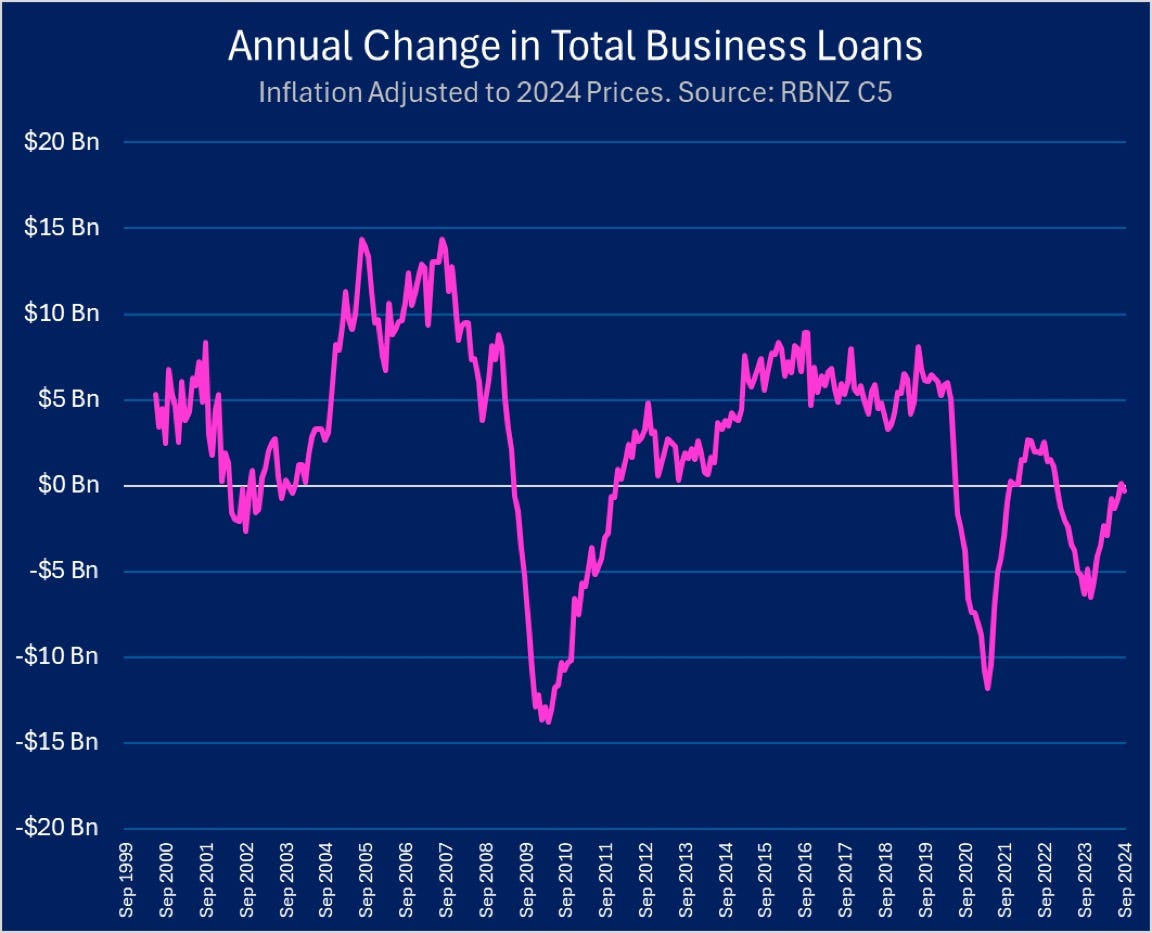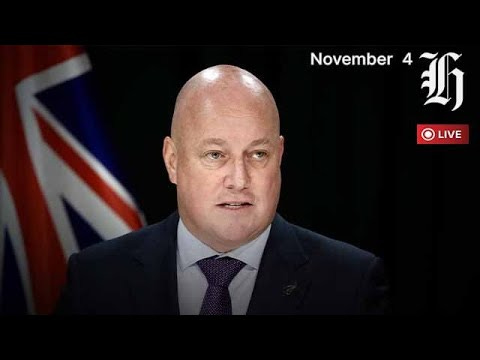Kia ora. Long stories short, here’s my top six things to note in Aotearoa’s political economy around housing, climate and poverty on Tuesday, November 5:
Strangely for a party that prides itself on being a mainstream bastion of ‘small c’ conservatism, National under PM Christopher Luxon is increasingly at risk of becoming consumed from the inside-out by the extremist policies of some National ministers and those of its coalition partners NZ First & ACT.
Scoop of the day: RMA reforms being hastily reversed by the Government could cost more than a quarter of a billion dollars. NZ Herald-$$$’s Kate MacNamara reports.
Deep-dive of the day: Repeated and invasive Police raids on gang homes in Opotiki are alarming local iwi.
Solutions news: The Nelson Tasman Housing Trust is pushing ahead with house-building on council land.
Quote of the day: Mental Health Foundation CEO Shaun Robinson says the 656 vacancies in mental health and addiction roles at Health NZ reflects decades of neglect and won’t be solved quickly. RNZ
Chart of the day: New Zealand’s businesses have basically stopped borrowing to invest in new R&D and technology because spare savings are increasingly going into residential land ‘investment.’
(There is more detail, analysis and links to documents below the paywall fold and in the podcast above for paying subscribers. If we get over 100 likes we’ll open it up for public reading, listening and sharing.)
1. When the parasites eat the host from the inside out
Luxon’s National sidling away from mainstream centre-right
Watching PM Christopher Luxon defending the attacks on health ministry officials by NZ First Minister Casey Costello last night was unsettling. It reminded me of a news story I stumbled across last month about the discovery of a fungus called Gibellula on the west coast of Scotland. It’s a fungus that infects spiders through fungal spores, and then slowly grows to digest the insect from the inside out.
“It’s part of a group of fungi that are known for turning their victims into ‘zombies,' compelling them to act in a certain way before killing them.” Ben Mitchell, who is part of the West Cowal Habitat Restoration Project via IGN
It’s the type of fungal parasite viewers of ‘The Last of Us’ will be familiar with.
Costello has been the focus of intense questions from both the media and her own ministry about her use of tobacco industry research to justify a $200 million tax cut for Phillip Morris, to encourage smokers to use heated tobacco.
Luxon was asked by 1News reporter Benedict Collins about comments in emailed advice from officials that Costello was cherry-picking ‘crap’ evidence to back her position in support of lower taxes on Phillip Morris.
“I can tell you that minister is very very focused on making sure she lowers daily smoking rates and delivers on Smoke-free 2025, but what I'd also reject is your characterization of it as a tax break.
“What we are saying is if we move people from cigarettes into alternatives, and particularly in this case heated tobacco products, that actually we will collect less excise tax as a government because they won't be on cigarettes.” Luxon in his post-cabinet news conference yesterday (21:53 to 23:17).
Subsequently, Costello went on to issue a statement to 1News saying:
“(The emails show) yet again, officials undermining the Government’s harm-reduction approach to reducing smoking rates.
"I have spoken to the Director-General about the importance of maintaining public sector standards of integrity and political neutrality.” Casey Costello via 1News.
This isn’t the first time Luxon has had to defend his NZ First and ACT ministers ignoring official advice, threatening officials, criticising judges, denying humans caused climate change and side-stepping the cabinet decision-making process.
It is one of many instances and demonstrates the extent to which National is being eaten alive from the inside out by policies a long way from the centre-right small-c-conservative mainstream or ‘compassionate conservatism.’ Not all are from NZ First and ACT. His Transport, Energy & Local Government Minister, Simeon Brown, has stepped a long way from mainstream policy with his blanket and evidence-free backing of new motorways and higher speed limits at the expense of public transport and lower climate emissions. His Finance Minister Nicola Willis proceeding with an austerity strategy to cut per-capita Government spending by more than National’s Ruth Richardson did in 1991.
Here’s a selection of instances and policies since the swearing in of the Government that is increasingly disturbing to the ‘true-blue’ National Party members in the regions and provinces that elected them:
Luxon reneging on a National election promise to rebuild Dunedin hospital fully;
Luxon agreeing to David Seymour’s decision to break a promise to keep supporting Christchurch home-buyers of poorly repaired homes;
Luxon agreeing to NZ First & ACT demands to reverse restrictions in tobacco sales to accelerate a move to Smokefree 2025;
Luxon agreeing to the removal of first-home buyer subsidies to save money;
Luxon first agreeing to ACT’s demands to dismantle the food for schools programme completely, and then backtracking to a smaller programme, before allowing bigger cuts to include primary schools;
Luxon agreeing not to pay for cancer drugs promised for Budget 2024, before a voter backlash saw the promise reverse-engineered into the Budget within a few weeks; and,
Luxon agreeing to NZ First & ACT’s demands that Treaty-gutting legislation be debated (in the case of the Treaty Principles Bill) in Parliament, while other Treaty clauses are gutted in other bills and the Foreshore & Seabed Act is unravelled.
It’s worth remembering that National has a proud history while in Government from 1990 to 1999 and again from 2008 to 2017 of doing Treaty settlement deals, agreeing to include Te Pāti Māori in its Government, and creating Whanau Ora and Smokefree 2025 with Te Pāti Māori.
The disquiet among National’s supporters is growing, as Post columnist Janet Wilson, a former press secretary for once-National Leader Judith Collins, articulated in September:
There’s a bewildering political naivety in agreeing to a coalition deal which is contrary to your own values, which you are losing political capital on daily while your junior coalition partner runs rings around you.
Christopher Luxon’s first term will be defined by an issue he doesn’t agree with, yet he signed up for, in the process destroying decades of National-Māori relations.
Meanwhile hate and mistrust will grow. All because a deal he took to get into power took precedence over his values. Janet Wilson in The Post-$$$
Other cases today of the Government being driven by NZ First & ACT
Seymour announces 'full stop' on quake payout scheme RNZ
Scientists concerned about delays to critical report RNZ
Blood cancer patients call on National to honour commitment RNZ
2. Scoop du jour: When change is costly
Public Purse: The cost of successive resource management reform will easily top a quarter of a billion dollars, but will it go higher still? NZ Herald’s Kate MacNamara
Honorable mention
MPI questions Climate Commission’s native planting targets Newsroom’s Marc Daalder
3. Deep-dive du jour: Toddler left alone
This story was mentioned in the PM’s news conference yesterday and we’ll be hearing more about this. Mark Mitchell denied it was true, but iwi in Opotiki are concerned.
Speaking at his post-Cabinet press conference, Luxon was asked about reports of a 3-year-old child being put in the back of a police vehicle during a recent gang-linked police raid in Ōpōtiki, while its mother and grandmother were handcuffed by officers.
Luxon said it was “not acceptable” if those reports were accurate but was quick to add the behaviour of gangs was “utterly unacceptable”. Mitchell also said he had not been briefed about the toddler being put by herself into the back of a police car.
“Clearly that’s not what we want to see happen and it would be great if the children could be better looked after but the reality is we’re going to be tough on gangs, we are going to harass gangs,” Luxon said.
'Violated': Kuia claims she was strip-searched in Ōpōtiki police gang raids, children ‘traumatised’ NZ Herald’s Joseph Los’e
'We are the mana of this land': Iwi slam police over Mob bust, threaten to block future raids NZ Herald’s Joseph Los’e
4. Solutions news: The Nelson Tasman Housing Trust
There’s great work being done in Nelson to build new social housing, but a lot more is needed, as RNZ’s Samantha Gee reports.
Ministry of Social Development data shows as of September, there were 294 people in Nelson and 153 people in Tasman on the wait list for public housing.
(Nelson Tasman Housing Trust director Carrie) Mozena said in addition to that, the trust also had over 200 people on its waitlist who were in need of housing. It's research showed there were around 600 more people looking for affordable rental housing who were not on any waitlist.
"It's quite a big problem that has been developing for many years and we are one of the many organisations working to make a difference."
The trust has two rent support schemes - it offers affordable rentals where those on low to moderate incomes are charged rent at 80 per cent of the market rate. It also offers public housing, where residents spend 25 percent of their income on rent, with the remainder subsidised by the Government's income related rent subsidy.
"Both of those make it possible for people on low incomes to stay in housing and get ahead. Some of our residents over the years, maybe four or five, have been able to save up enough to go and buy a home."
The two properties in Tōtara St were purchased from the Nelson City Council in 2022 for $715,000 and Mozena said the total project cost was $4.2 million (inclulding the land) and took two years to bring to completion. RNZ’s Samantha Gee
Honorable mention:
Māori businesswomen win top award amid school lunch contract loss NZ Herald’s Matai O’Connor
5. Quote du jour: What the 30/30 rule did
“This level of vacancies hasn't emerged overnight. It's been mounting over the last decade and yet there has been very slow movement to address it, either from politicians or the health system itself.” Mental Health Foundation CEO Shaun Robinson on the 656 vacancies in mental health and addiction roles at Health NZ, which doubled between 2018 and 2022. Via RNZ’s Jimmy Ellingham on Checkpoint.
6. Chart of the day: A housing market with bits tacked on

The Kākā’s Journal of Record for Tuesday, November 5
South Island & Housing: The Natural Hazards Commission has scaled back its financial support programme for homeowners who bought properties not properly repaired after the Canterbury earthquakes, under changes requested by Associate Finance Minister David Seymour. Applicants will now face stricter deadlines and new limits on what they can receive. The Labour Party said the programme was making up for "botched repairs" by the EQC. RNZ
Economy & Housing: Several NZ banks identified increasing geopolitical tension as a threat to their capital levels and a "primary driver" of economic downturns, under risk scenario modelling requested by the Reserve Bank. Banks' response strategies to scenarios including spikes in unemployment and falls in property prices are also explored in the RBNZ's Financial Stability Report due later today.
Poverty: The Child Poverty Action Group reported that Child Poverty Reduction Minister Louise Upston was advised that NZ will remain "off-track" from reaching its ten-year child poverty reduction targets without "significant" further investment. The documents also showed that Upston considered changing the ten-year targets in June 2024, but decided it was “not the right time.”
Poverty & health: The Green Party called for more publicly funded dental care after a report by Frank Group estimated annual economic losses due to poor oral health at $2.5 billion. Campaign group Dental for All said the report shows current dental policy settings are more expensive for NZ than universal funding for dental care.
Health: The Public Health Communication Centre's latest briefing argued NZ could reduce the risk of future pandemics and lower the cost of pandemic preparedness through formalised co-operation with Australia and Pacific Island nations. The briefing explored possibilities for NZ-Australia co-operation, including co-ordinated disease surveillance, shared quarantine facilities for travelers, and collaborative simulation modelling.
Housing & economy: Barfoot & Thompson's Auckland housing market update for October found the number of listings was up 29.1% compared with October 2023. The average Auckland house price, $1,129,950, was up 4.5% compared with September 2024, and the median price, $955,000, was up 2.2%.
Cartoon of the day: Signs ‘o the times

Nature pic of the day: Leaves can be pretty too
Ka kite ano
Bernard













Share this post